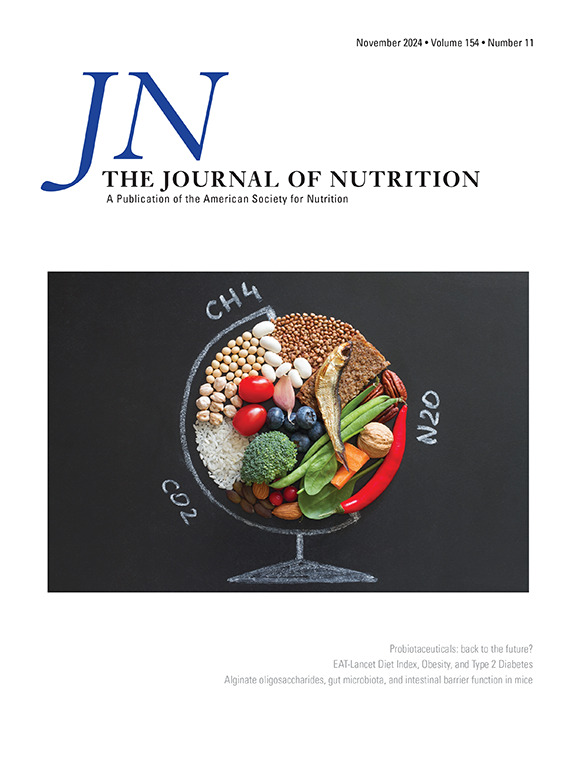Comparison of the Effects of Inappropriate Meal Timing-Induced and Genetic Models of Circadian Clock Disruption on Uterine mRNA Expression Profiles
IF 3.8
3区 医学
Q2 NUTRITION & DIETETICS
引用次数: 0
Abstract
Background
Accumulating evidence reveals that inappropriate meal timing contributes to the development of lifestyle-related diseases. An underlying mechanism is thought to be the disruption of the intracellular circadian clock in various tissues based on observations in both systemic and tissue-specific clock gene-deficient mice. However, whether the effects of conditional clock gene knockout are comparable to those of inappropriate meal timing remains unclear.
Objectives
This study aimed to compare the effects of a recently developed 28-h feeding cycle model with those of a core clock gene Bmal1 uterine conditional knockout (Bmal1 cKO) model on uterine mRNA expression profiles.
Methods
The models were generated by subjecting C57BL/6J mice to an 8-h/20-h feeding/fasting cycle for 2 wk and crossing Bmal1-floxed mice with PR-Cre mice. Microarray analyses were conducted using uterine samples obtained at the beginning of the dark and light periods.
Results
The analyses identified 516 and 346, significantly 4-fold and 2-fold, up- or downregulated genes in the 28-h feeding cycle and Bmal1 cKO groups, respectively, compared with each control group. Among these genes, only 7 (1.4%) and 63 (18.2%) were significantly up- or downregulated in the other model. Moreover, most (n = 44, 62.9%) of these genes were oppositely regulated. These findings were confirmed by gene set enrichment analyses.
Conclusions
This study reveals that a 28-h feeding cycle and Bmal1 cKO differently affect gene expression profiles and highlights the need for considering this difference to assess the pathophysiology of diseases associated with inappropriate meal timing.
比较进餐时间不当和遗传模式昼夜节律紊乱对子宫 mRNA 表达谱的影响。
背景:越来越多的证据表明,不恰当的进餐时间会导致与生活方式有关的疾病的发生。根据对全身性和组织特异性时钟基因缺陷小鼠的观察,其潜在机制被认为是细胞内各组织昼夜节律时钟的紊乱。然而,有条件的时钟基因敲除与不恰当的进餐时间的影响是否具有可比性仍不清楚:本研究旨在比较最近开发的 28 小时进食周期模型与核心时钟基因 Bmal1 子宫条件性基因敲除(Bmal1 cKO)模型对子宫 mRNA 表达谱的影响:方法:将C57BL/6J小鼠置于8-h/20-h的进食/禁食周期,持续2周,然后将Bmal1基因缺失的小鼠与PR-Cre小鼠杂交。利用在黑暗期和光明期开始时获得的子宫样本进行了微阵列分析:分析发现,与各对照组相比,28小时喂养周期组和Bmal1 cKO组分别有516个和346个基因上调或下调,分别显著增加了4倍和2倍。在这些基因中,只有 7 个基因(1.4%)和 63 个基因(18.2%)在其他模型中明显上调或下调。此外,这些基因中的大多数(n = 44,62.9%)是相反调控的。这些发现在基因组富集分析中得到了证实:这项研究揭示了28小时进食周期和Bmal1 cKO对基因表达谱的不同影响,并强调了在评估与进食时间不当有关的疾病的病理生理学时考虑这种差异的必要性。
本文章由计算机程序翻译,如有差异,请以英文原文为准。
求助全文
约1分钟内获得全文
求助全文
来源期刊

Journal of Nutrition
医学-营养学
CiteScore
7.60
自引率
4.80%
发文量
260
审稿时长
39 days
期刊介绍:
The Journal of Nutrition (JN/J Nutr) publishes peer-reviewed original research papers covering all aspects of experimental nutrition in humans and other animal species; special articles such as reviews and biographies of prominent nutrition scientists; and issues, opinions, and commentaries on controversial issues in nutrition. Supplements are frequently published to provide extended discussion of topics of special interest.
 求助内容:
求助内容: 应助结果提醒方式:
应助结果提醒方式:


